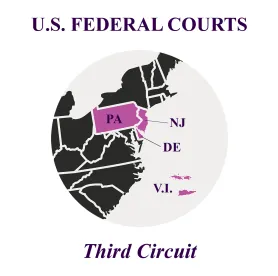Trademark infringement lawsuits are among the risks faced by businesses running comparative advertisements referring to a competitor’s products. When facing such a suit, policyholders should be sure to look to their commercial general liability (CGL) policies as potentially valuable sources of insurance coverage. This important point is underscored by a recent decision of the United States Court of Appeals for the Third Circuit.
That court recently confirmed, in a precedential decision, that a CGL insurer had a duty to defend its policyholder against a competitor’s trademark-infringement lawsuit arising from advertisements that allegedly contained false or misleading product comparisons.1 The court confirmed that valuable defense coverage for suits alleging product “disparagement” can be triggered by comparative statements flattering the policyholder’s own product, thereby implying a competitor’s product is inferior. The court squarely rejected common insurance industry arguments for a far narrower scope of coverage in its pro-policyholder ruling, including arguments that the advertising at issue must overtly and affirmatively attack the competitor’s product. Importantly for policyholders, the ruling confirms that standard “disparagement” coverage can apply to a variety of causes of action—including trademark infringement—and is not limited to a narrow set of torts such as trade libel.
THE UNDERLYING ACTION
Vitamin Energy, LLC (Vitamin Energy) was sued by the owners of the trademark for the 5-hour Energy brand, a competitor, for publishing certain comparative claims and infringing the 5-hour Energy mark in advertising and packaging. The suit included claims under the Lanham Act for trademark infringement, false designation of origin, false advertising, and trademark dilution.
Among the allegations was an assertion that Vitamin Energy engaged in “false and misleading advertising” about its products relative to those of its competitors, including 5-hour Energy. The underlying complaint alleged that the comparative advertisement is “literally false and/or misleading” based on the claim that Vitamin Energy’s product had certain values, such as “100% Daily Value of Vitamin B.” It also alleged the advertisement “is intended to leave, and does leave, the false and/or misleading impression that, among other things … [Vitamin Energy’s] Products are superior to other products in the market, including [5-hour Energy’s] Products.”
THE TRIAL COURT’S COVERAGE RULING
Vitamin Energy had obtained a CGL policy from Evanston Insurance Company (Evanston) under which Vitamin Energy sought coverage for the 5-hour Energy lawsuit. Like typical modern CGL insurance policies, the Evanston policy included coverage for various types of “Advertising Injury” defined to include, among other offenses, an injury “arising out of … defamatory or disparaging material, occurring in the course of the Named Insured’s Advertisement.” Evanston denied coverage, however, and Vitamin Energy commenced a suit seeking a declaration that Evanston had a duty to defend. On cross-motions for judgment on the pleadings, the district court ruled that the underlying complaint did not allege an advertising injury within the meaning of the policy.
THE THIRD CIRCUIT RULES THE INSURER HAS A DUTY TO DEFEND
In reversing the district court’s ruling for the insurer, the Third Circuit articulated the broad contours of “disparagement” coverage and of an insurer’s duty to defend, demonstrating that a complaint can trigger coverage even without alleging that an advertisement explicitly attacked the competitor’s product. Applying Pennsylvania law, the Third Circuit ruled that Evanston had a duty to defend Vitamin Energy, because at least one of the allegations in the underlying action was potentially covered as an advertising injury.
The Evanston policy defined “advertising injury,” in part, as an injury “arising out of … defamatory or disparaging material, occurring in the course of the Named Insured’s Advertisement.” The parties agreed that the term “disparaging material” includes “an injurious false statement about another’s goods.”
Thus, the salient issue was whether 5-hour Energy’s complaint alleged that Vitamin Energy’s comparative advertisement contained disparaging statements about 5-hour Energy’s products, on the one hand, or only statements about Vitamin Energy’s own products, on the other. Evanston argued that the complaint only alleged false and misleading statements about Vitamin Energy’s own products, which would not constitute “disparaging material” under the policy.
However, the court noted that the underlying complaint included an allegation that Vitamin Energy’s claim that its products contain “100% Daily Value of Vitamin B” is intended to, and does, leave the false and misleading impression that Vitamin Energy’s products contain more Vitamin B than 5-hour Energy’s products. The court reasoned that this allegation, when construed liberally as required under Pennsylvania law, was “potentially” covered. That is, at least for purposes of the duty to defend, the complaint must be read as alleging not only that Vitamin Energy claimed its products contained 100% of the daily recommended value, but also that it disparaged 5-hour Energy’s products by claiming they did not contain that level.
Thus, and importantly from the policyholder’s perspective, an advertisement need not overtly and affirmatively attack a competitor’s product with false claims in order to trigger insurance coverage for disparagement, nor is coverage limited to certain business torts such as trade libel. Rather, a claim about a company’s own product that implies certain qualities about a competitor’s product can be sufficient.
The court also rejected Evanston’s arguments that certain exclusions preclude coverage. Notably, the court ruled that the common “failure to conform” exclusion did not preclude a duty to defend, because when properly construed the comparisons contained allegedly false statements about the competitor’s product, not just the policyholder’s own products.2 Additionally, the court held that the policy’s “Intellectual Property” exclusion did not excuse the insurer from its duty to defend, even though the complaint included allegations of trademark infringement.3 The court explained that exclusions that apply to some of a complaint’s allegations but not others do not excuse an insurer from defending the entire suit. Therefore, Evanston had a duty to defend Vitamin Energy against the underlying lawsuit in its entirety.
CONCLUSION
The Third Circuit’s ruling is part of a trend in favor of coverage for “disparaging” advertising claims, even without an express count of “trade libel” or the like. In a comparable case also issued earlier this year, the Massachusetts Court of Appeals held that a complaint containing factual allegations that a policyholder made false assertions about an individual’s product and making multiple references to that individual’s character was sufficient to trigger a duty to defend under “disparagement” coverage.4 Even though the claim did not specifically allege slander or libel, the allegations were “enough to raise the possibility that the complaint alleged a ‘personal or advertising injury.’”5
Vitamin Energy and other cases confirm that policyholders should consider reviewing their CGL policies when they confront claims that concern their advertising or labeling of products. While insurers may resist coverage, advertising injury coverage can be an extremely valuable asset when established insurance coverage principles such as the duty to defend are properly applied.
1 Vitamin Energy, LLC v. Evanston Ins. Co., 22 F.4th 386 (3d Cir. Jan. 5, 2022).
2 A typical version of the “Failure to Conform” exclusion purports to preclude coverage for “any Claim based upon or arising out of the failure of products, goods or services to conform with any statement of quality or performance made in the Named Insured’s Advertisement.”
3 The policy at issue purported to exclude coverage for “any Claim based upon or arising out of Personal Injury or Advertising Injury arising out of piracy, unfair competition, the infringement of copyright, title, trade dress, slogan, service mark, service name or trademark, trade name, patent, trade secret or other intellectual property right.”
4 EL Grp., LLC v. Utica Nat’l Ins. Grp., No. 21-P-298, 2022 WL 53118 (Mass. App. 2022).
5 Id. at *2.





 />i
/>i

